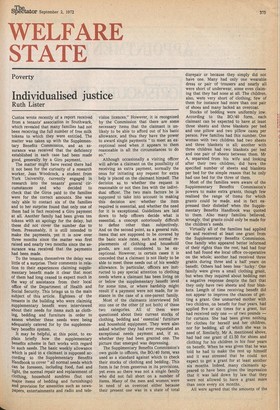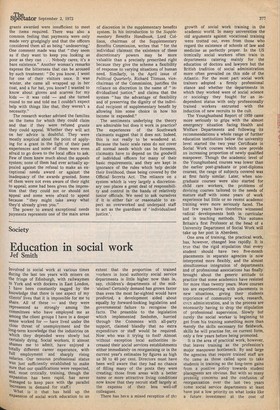WELFARE STATE
Poverty.
Individualised justice
Ruth Lister
Custos wrote recently of a report received from a tenants' association in Southwark, which revealed that many families had not been receiving the full number of free milk tokens to which they were entitled. The matter was taken up with the Supplementary Benefits Commission, and an assurance was received that the deficiency established in each case had been made good, generally by a Giro payment.
The matter might have rested there had it not been for the curiosity of a research worker, Jean Woodcock, a student from York University, currently engaged in research into the tenants' general circumstances and who decided to check that the Giros paid to the families were for the correct amounts. She was only able to contact six of the families and to her surprise found that only one of them had in fact received a Giro payment at all. Another family had been given ten tokens with an apology for the delay, but these did not cover the number due to them. Presumably, it is still intended to make the payments, yet it is now over three months since the matter was first raised and nearly two months since the assurance was received that the payments had been made.
To the tenants themselves the delay was little of a surprise. Their comments in relation to their experiences claiming supplementary benefit made it clear that most of them had long ceased to expect much in the way of assistance from their local office of the Department of Health and Social Security. This brings us to the main subject of this article. Eighteen of the tenants in the building who were claiming supplementary benefit were interviewed about their needs for items such as clothing, bedding and furniture in order to assess whether these needs were being adequately catered for by the supplementary benefits system.
It may be helpful, at this point, to explain briefly how the supplementary benefits scheme in fact works with regard to such needs. The basic weekly allowance Which is paid to a claimant is supposed according to the Supplementary Benefits Handbook to cover" all normal needs which can be foreseen, including food, fuel and light, the normal repair and replacement of Clothing, household sundries (but not major items of bedding and furnishings) and provision for amenities such as newspapers, entertainments and radio and tele vision licences." However, it is recognised by the Commission that there are some necessary items that the claimant is unlikely to be able to afford out of his basic allowance, and thus they have the power to award single payments "to meet an exceptional need when it appears to them reasonable in all the circumstances to do so."
Although occasionally a visiting officer will advise a claimant on the possibility of receiving an extra payment, normally the onus for initiating any request for extra help is placed on the claimant himself. The decision as to whether the request is reasonable or not then lies with the individual officer. The two main factors he is supposed to take into account in making this decision are: whether the item required is essential, and whether the need for it is exceptional. Guidelines are laid down to help officers decide what is essential, a concept notoriously difficult to define other than subjectively. And on the second point, as a general rule, items that are supposed to be covered by the basic scale rates, such as normal replacements of clothing and household goods, are not considered to be exceptional. However, in certain cases it is conceded that a claimant is not likely to be able to meet these needs out of his weekly allowance. In particular, officers are instructed to pay special attention to clothing needs where a claimant has been living on or below the supplementary benefit level for some time, or where hardship might result if a payment were not made, for instance in the case of a one-parent family.
Most of the claimants interviewed fell into one or the other (if not both) of these two categories. All of them Were questioned about their current stocks of clothing, bedding and 'essential' furniture and household equipment. They were also asked whether they had ever, requested an exceptional needs payment and, if so, whether they had been granted one. The picture that emerged was depressing. The Supplmentary Benefits Commission's own guide to officers, the B0/40 form, was used as a standard against which to heck their stocks of clothing and bedding. This form is far from generous in its provisions, yet even so there was not a single family who did not fall short on a number of items. Many of the men and women were in need of an overcoat either because their present one was in a state of total disrepair or because they simply did not have one. Many had only one wearable dress or pair of trousers and nearly all were short of underwear, some even claiming that they had none at all. The children, also, were very short of clothing; few of them for instance had more than one pair of shoes and many lacked an overcoat.
Stocks of bedding were uniformly low. According to the B0/40 form, each claimant can be expected to have at least three sheets and three blankets per bed and one pillow and two pillow cases per person. Few families had this number. One woman with two children had two sheets and three blankets in all; another with three children had two blankets per bed and one pair of sheets between them. Mr A, separated from his wife and looking after their two children, did have the specified number of sheets and blankets per bed for the simple reason that he only had one bed for the three of them.
Most of the families were aware of the Supplementary Benefits Commission's powers to make extra grants, though few realised the range of items for which grants could be macle, and in fact expressed their disbelief when the Supplementary Benefits Handbook was quoted to them. Also many families believed, wrongly, that grants could only be made for the children's needs.
Virtually all of the families had applied for and received at least one grant from the Supplementary Benefits Commission. One family who appeared better informed of their rights than the rest, had had four and had found the local office co-operative on the whole; another had received three grants during three and a half years on benefit. Others had been less lucky.' One family were given a small clothing grant, but when they inquired about bedding met a negative response despite the fact that they only have two sheets and four blankets. Length of time receiving benefit did not appear to improve the chances of getting a grant. One unmarried mother with two children, on benefit for four years, had applied five or six times for a grant, but had received only one — of two pounds --for curtains. She had been given nothing for clothes for herself and her children, nor for bedding, all of which she was in need of. Similarly, Mr A, mentioned above, had had one grant of £1.50 for shoes and clothing for his children in his four years on benefit. When he was given that he was told he had to make the rest up himself and it was stressed that he could not expect to get a grant for at least another six months. Indeed, many claimants appeared to have been given the impression that it was laid down by law that they were not allowed to have a grant more than once every six months.
All were agreed that the amounts of the grants awarded were insufficient to meet the items required. There was also a common feeling that payments were only made very grudgingly and that the officers considered them all as being 'undeserving.' One comment made was that "they seem as if they want to keep you looking as poor as they can . . . Nobody cares, it's a bare existence." Another woman's remarks express the bitterness that can be aroused by such treatment: "Do you know, I went for one of their visitors once. It was winter, she came all wrapped up in her coat, and a fur hat, you know? I wanted to know about gloves and scarves for my kids — it was cold — and she turned round to me and told me I couldn't expect help with things like that, they weren't a necessity."
The research worker advised the families on the items for which they could claim and that if they were refused grants they could appeal. Whether they will act on her advice is doubtful. They were mostly sceptical about the point of applying for a grant in the light of their past experiences and some of them were even afraid to go down to the local office to ask. Few of them knew much about the appeals system; none of them had ever actually appealed against the refusal to make an exceptional needs award or against the inadequacy of the awards granted. Some of them were not even aware of their right to appeal; some had been given the impression that they could not or should not appeal and some were afraid to appeal because "they might take away what they'd already given you."
The power to award exceptional needs Payments represents one of the main areas
of discretion in the supplementary benefits system. In his introduction to the Supplementary Benefits Handbook, Lord Collison, chairman of the Supplementary Benefits Commission, writes that "for the individual claimant the existence of these discretionary powers may be more valuable than a precisely prescribed right because they give the scheme a flexibility of response to varying situations of human need. Similarly, in the April issue of Political Quarter/y, Richard Titmuss, vicechairman of the Commission, justifies the reliance on discretion in the name of "individualised justice," and claims that the system "has the advantage of flexibility and of preserving the dignity of the individual recipient of supplementary benefit by allowing him some choice in how his income is expended."
The sentiments underlying the theory are admirable but does it work in practice? The experiences of the Southwark claimants suggest that it does not. Indeed, this is not really to be wondered at. Because the basic scale rates do not cover all normal needs which can be foreseen, claimaitts have to depend on the goodwill of individual officers for many of their basic requirements, and they are kept in ignorance of the rules which help decide their livelihood, these being covered by the Official Secrets Act. The reliance on a system which is very largely a discretionary one places a great deal of responsibility and control in the hands of relatively junior officials. We need to ask ourselves if it is either fair or reasonable to expect an overworked and underpaid staff to act as the guardians of individualised justice.' ,







































 Previous page
Previous page